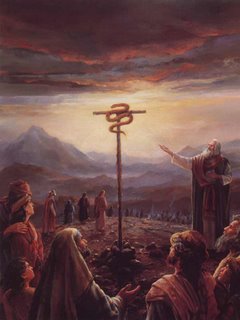
OBSERVATION
This gospel has many things to tell us about the theology of John:
- It is part of the conversation that Jesus had with Nicodemus, who is the recipient of Jesus “born again” teaching.
- It contains John 3:16, one of the most famous and widely-quoted verses of the Bible: "For God so loved the world that He gave His one and only Son, that whoever believes in Him shall not perish but have eternal life".
- It talks about the condition for “eternal life,” which is to believe in Jesus
- It talks about God being the “light” of the world and yet the world preferred darkness.
This commentary focuses on the first verse: Jesus is compared to a serpent being lifted up. Usually in the Old Testament, a snake symbolizes evil such as the one which tempted Adam and Eve. While in the New Testament, Jesus Christ represents everything that is good. Therefore, why would the apostle John associate Jesus with something evil?
INTERPRETATION
During Moses’ time, God punished the rebellious Hebrews by sending hordes of venomous snakes which resulted in the death of many people. When the Hebrews asked for forgiveness, God ordered Moses to make a bronze serpent and to lift it up on a pole. The people who had snake-bites looked with faith at the bronze serpent, and they were healed afterwards.
Similar to the bronze serpent being lifted up on a pole, Jesus was also lifted up on the cross. Moreover, the bronze serpent and Jesus were both sources of life.
Thus, the comparison is not between Jesus and the serpent, but to the “lifting up” of Jesus and the serpent.
For John, Jesus went down from the Father to the world and the “lifting up” refers to the “upward swing” of Jesus back to the Father, which consists of three main events:
- Jesus being “lifted up” on the cross
- Jesus is “raised” from the dead
- Jesus “ascends” to heaven.
GENERALIZATION
Jesus is the way to the Father. Our own “lifting up” to the Father should follow the pattern of Jesus, and it begins with the cross. It is not the intention of God that we suffer, but practicing our faith always entail a sacrifice.
APPLICATION
Let’s apply the message of the gospel in our Singles Apostolate’ Values. For example, one of our values is Caring and it states: “we seek personal reconciliation over issue resolution when relationships are broken.”
That means we take the initiative to mend the relationship even though we are the ones that have been wronged. Difficult? Definitely. But perhaps that’s the cross that Jesus was referring to.
- What is the thing that you find most difficult to do, but you know would lead you closer to God?

